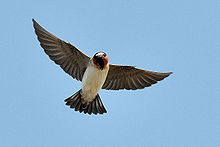American cliff swallow
| American cliff swallow | |
|---|---|
 |
|
| Scientific classification | |
| Kingdom: | Animalia |
| Phylum: | Chordata |
| Class: | Aves |
| Order: | Passeriformes |
| Family: | Hirundinidae |
| Genus: | Petrochelidon |
| Species: | P. pyrrhonota |
| Binomial name | |
|
Petrochelidon pyrrhonota Vieillot, 1817 |
|
| Synonyms | |
|
Petrochelidon lunifrons |
|
Petrochelidon lunifrons
The American cliff swallow (Petrochelidon pyrrhonota) is a member of the passerine bird family Hirundinidae — the swallows and martins.The scientific name is derived from Ancient Greek. Petrochelidon is from petros, "rock", and khelidon, "swallow", and pyrrhonota from purrhos, "flame-coloured", and -notos "-backed".
It breeds in North America and is migratory, wintering in western South America from Venezuela southwards to northeast Argentina. This species is a very rare vagrant to western Europe.
This bird averages 13 cm (5.1 in) long with a tiny bill. The adult cliff swallow has an iridescent blue back and crown, brown wings and tail, and buff rump. The nape and forehead are white. The underparts are white except for a red face. The tail is square-ended.
Young birds are essentially brown above and whitish below, except for the buff rump and dark face. The only confusion species is the closely related cave swallow, which is richer in colour and has a cinnamon rump and forehead.
Like all swallows and martins, cliff swallows subsist primarily on a diet of insects which are caught in flight.
American cliff swallows nest in colonies ranging from a few breeding pairs to thousands of birds, depending on the area and year. The number of breeding pairs in an area per year generally increases with temperature, though larger colonies are more likely to suffer from parasites and intraspecific competition.
They build conical mud nests and lay three to six eggs. The natural nest sites are on cliffs, preferably beneath overhangs, but as with the Eurasian house martin, man-made structures are now the principal locations for breeding. Female American cliff swallows are known to lay eggs in and move previously laid eggs into the nests of other birds within the colony.
...
Wikipedia

